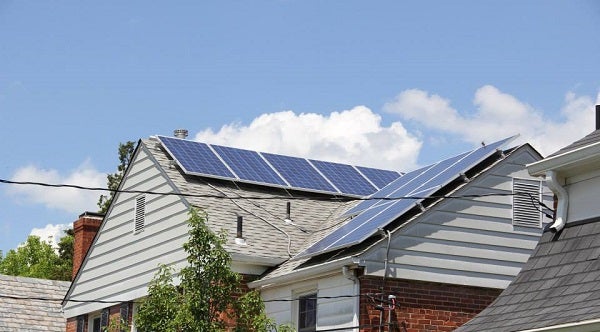New study confirms solar’s benefit to all D.C. ratepayers

When solar owners generate electricity, they consume less electricity from the grid. Nearly, everyone agrees that producing your own power, means you should lower your bill. Furthermore, there are times during the day when solar homeowners may produce more electricity than their homes use. That electricity is sent to neighboring buildings. Everyone agrees that those solar owners deserve compensation for providing their excess electricity. The question is: how much? A new study commissioned by the Office of the People’s Council (OPC) finds that solar generated by homeowners may currently be undervalued.
D.C. utility customers who generate solar on their rooftops are compensated through net metering. Net metering essentially provides a one-to-one credit. This means solar homeowners are paid the retail electricity rate for the electricity they produce. They get the full retail cost of energy , transmission, distribution, and taxes, worth roughly 13.5 KWH. These additional costs are included because the utility isn’t transferring the electricity to solar homeowners, the homeowners aren’t buying the electricity, and they shouldn’t have to pay taxes on it. For more information about net metering, see Pepco’s explainer.
Net metering developed out of the technical limitations of analog electricity meters. When a grid connected roof top solar system produced electricity first feeds demand in the house. When solar production outpaces this demand, the excess electricity would roll out through the electric meter, causing it to run backwards.
New digital meters enable utilities to tell when systems are generating excess electricity and thus reimburse solar customers at a different (i.e. lower) rate. This ability has encouraged utilities to argue they should pay solar customers less than the net-metered rate. Across the country, utilities have flexed their significant financial muscle to urge policy makers to limit what they have to pay to solar customers. They argue solar customers are using utility infrastructure but not paying for the cost to maintain. Solar customers counter that solar provides unique benefits to the grid that are not captured by net-metered payments.
In response to these fights—policymakers are trying to introduce good facts into the debate. The D.C. OPC showed real leadership by conducting a professional study to fairly evaluate the benefit that solar brings to the grid. In effect, the study asks if the value solar provides to the grid is negative or positive. The study found what we have always argued. Solar in D.C. is good for solar and non-solar customers alike. It lowers electricity costs, reduced need for expensive grid upgrades, creates jobs, and reduces pollution.
The OPC-funded study found the value of solar energy to be worth 13¢/kWh to the utility (as compared to the 13.5 cents that solar customers get for their energy through net metering). Furthermore, the study found that when the full societal impact is calculated, including things like health and environment, the value of the energy to society was 19¢/kWh. This shows solar isn’t just good for the people who go solar, it helps all rate payers and by reducing demand, and reducing the need for new infrastructure as it puts a downward pressure on rates for all D.C. residents.
These numbers were derived by Synapse Energy, the consulting firm hired by OPC to complete the study. Synapse Energy has done several similar Value of Solar studies across the country. The firm determined the value of solar to the utility system and to all District residents who use electricity by conducting a cost-benefit analysis. Some of the costs it looked at included increased costs to the utility for interconnection and administration. Benefits included the avoided costs of adding more generation and transmission capacity. It reviewed 18 different cost benefit categories in total.
This study provides valuable data to the solar community. This is particularly true as utility commissions around the country have, at the behest of utilities who see rooftop solar as a competitive threat, chosen to lower the compensation solar homeowners receive. We now have further evidence that solar PV provides benefits to all D.C. residents. You can read the full study here or the executive summary here.
